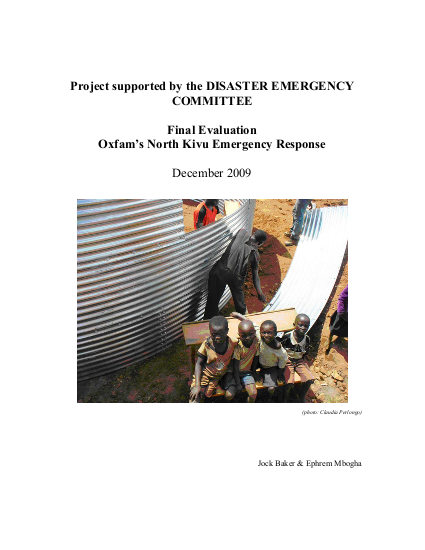
Numerous ceasefire agreements and military operations have failed to stabilise eastern Congo and civilians continue to suffer the consequences. The backdrop for this DEC project evaluation can be traced to the breakdown of the January 2008 “Goma agreement” when in late August 2008 renegade General Nkunda’s CNDP rebels launched a fresh counter-offensive and moved to the outskirts of Goma. Tens of thousands fled as DRC government troops abandoned their positions, looting, destroying property and raping civilians as they retreated. In January 2009, the Rwandan army entered DRC and, in collaboration with the FARDC, neutralised the main elements of the CNDP and launched a military offensive against the FDLR in North Kivu. Under intense international pressure, a peace deal between Kinshasa and CNDP ex-rebels was signed in March. This cooperation between DRC and Rwanda in some ways represented a political breakthrough, but it produced relatively limited results. The FDLR soon regrouped and began carrying out revenge attacks against civilians suspected of collaborating with the Rwandan army. In April 2009 the FDLR launched a string of attacks concentrated in areas to the north of Lubero. The humanitarian cost of the violence has been severe. Some 300,000 persons have been displaced since fighting resumed in early 2009 and in March 2009 the UN raised their estimates in North Kivu to a total of 800,000 IDPs. A DEC Appeal was launched in November 2008 to address the humanitarian crisis in Goma/Rutshuru following the CNDP offensive. A total of GBP 5.5 Million was dispersed amongst 12 agencies, out of which GBP 1.2 million was allocated to Oxfam for a nine month project that began implementation in the Rutshuru area during January 2009. Within a few weeks IDP numbers fleeing from a resurgence of the conflict to the north had swelled to over 300,000 and funds were redirected towards operations in North Kivu. The current evaluation was designed to look at organizational, beneficiary and technical aspects during implementation of this project using information from a desk review, stakeholder interviews, observation and field visits. Oxfam faced several challenges during the conception and implementation of this project, including setting up operations in new areas where there was ongoing conflict, recruiting staff, coping with management transitions, turnover of senior staff and difficulties in identifying suitably-qualified international French- or Swahili-speaking staff. Based on the available evidence, the evaluation team’s assessment was that Oxfam’s response was overall of good quality and, in Lubero, reasonably timely given logistics considerations and other constraints. The evaluation team was unable to visit Oxfam project sites in Rutshuru due to time and logistic constraints, but document review and interviews with Oxfam staff and external stakeholders suggested that the quality of their interventions and accountability towards beneficiaries in Rushuru was in many ways superior in comparison to Lubero, although the response there was relatively late. Oxfam’s technical capacity, willingness to share information (such as their multi-sectoral assessment) and prominent role in drawing attention to the humanitarian crisis in Lubero has been generally appreciated by peer agencies. At the same time, some key informants 1 December 2009 from other international agencies described Oxfam as an agency that is quick to use of their access to higher levels of the UN system or donor governments without always engaging to the extent expected by local level actors. The evaluation was also informed in an opportunistic fashion by the results of community consultations (facilitated by local authorities and OCHA) that took place in the wake of violent demonstrations by community members and IDPs in early November 2009 in Lubero that targeted international agencies. These meetings systematically reviewed different international agencies in considerable detail, including their approach to their work, the quality of interventions, the accountability of agencies, and their recruitment practices. Although Oxfam evacuated from Lubero with other international agencies (and had several windows in their office broken during the demonstrations), Oxfam approaches were often cited by community members as a good practice examples that other agencies should attempt to emulate. These consultations did nevertheless highlight certain gaps where Oxfam did need to improve, notably in being more transparent with local communities. The goal of Oxfam’s DEC-funded project was to contribute to the prevention/reduction of preventable communicable diseases, including cholera preparedness, through restoring coping mechanisms of 100,000 displaced persons and host communities in South Lubero and Rutshuru in North Kivu. Within the limits imposed by time and information availability described below, the assessment of the evaluation team was that project objectives had been achieved satisfactorily. Most of Oxfam’s interventions were judged to be relevant and effective thanks largely to an emphasis on community consultations, constructive local partnerships, ability to adapt to changing operating contexts and using their prior experience of working in eastern Congo. The efficiency of Oxfam’s interventions was hampered by delays in setting up operations in Rutshuru due to a combination of funding availability and approaches of Oxfam’s previous management which – relative to current management approaches – were more risk-adverse and prioritized longer-term programming over short-term humanitarian interventions. Further to the north, efficiency was adversely affected by the delay in shifting Oxfam’s centre of operations from Beni to Lubero. A summary of recommendations is provided at the end of this report which is intended to encouraged improvements in monitoring, quality control of engineered designs, information management, cost-effectiveness of water supply systems, partnership relationships and beneficiary accountability systems. Given that the focus of this evaluation is on a single project in eastern DRC, most recommendations are targeted at Oxfam’s senior managers in DRC. However some recommendations have wider institutional implications, including fulfilling Oxfam International’s institutional commitments to humanitarian reform and specifically what this means in terms of their accountability as a co-cluster lead for WASH in eastern DRC. Another recommendation specifically targeting Oxfam International is to review their protocol for deciding when and where to conduct RTEs.